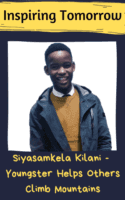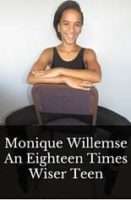The emergence of social media is a breath of fresh air because it draws people closer and enables immediate communication. However, it has also made people vulnerable to unexpected dangers and posed threats to their safety. One person who’s clued up about this topic is a social worker and researcher from Johannesburg, Goodness Zulu, whose Online Safety study speaks volumes.
“Learners who have access to the Internet, including those who do not make use of social networking sites, are potentially exposed to sexually explicit or pornographic material,” Goodness says in the study, which she carried out at Unisa’s College of Economic Management Sciences. The study aimed to shed light on how young people use the social network, and what risks they face.
“The ease of availability of online pornographic material impacts negatively on some learners’ belief systems, resulting in support by learners for the non-regulation of internet porn sites. This poses a serious risk of learners becoming addicted to pornography, and ultimately leads to dysfunctional behaviour of such learners,” says Goodness.
She urges parents to be cautious of what online material their children are consuming when they’re fiddling with their phones.
“You still are a parent and have a responsibility towards your child. Have rules so they can engage in face-to-face socialisation with other people. You can’t buy your child a car while you haven’t taken them to a driving school because you’ll be setting them up for failure. You must be free and open, so children can open up to you,” she advises.
Goodness is advising about good parenting, but where did she milk those good values from?
“My parents played a huge role in my life. My father was illiterate but he always emphasised he wanted me to get educated so I didn’t end up like him. He made every sacrifice just to ensure I get the best education there is. When I measure what he had and what I have now, I conclude that he was a successful man.”
Goodness was born in Gauteng but she had to be relocated due to political instability at that time: “There was such black-on-black violence that my parents decided to take me to KwaZulu-Natal, where I attended a boarding school. That’s where my leadership skills started to show in me. I became a prefect and a supervisor,” she recalls.
Goodness was always that child who always wanted to help others when they played poppie-huise. “In preparation for this interview I asked my mom what my childhood aspirations were, and she said I always wanted to be in the helping professions, that is, a nurse. My being a social worker was inspired and prepared for by my parents. My father wanted me to be a social worker. There weren’t many careers to choose from [back then]. My mom even arranged a social worker to tell me about the profession,” she laughs.
“My parents used to say education was more important for a woman because if I got involved in a difficult marriage it would be easy to leave and seek independence. Education gives the ability to stand on your two feet without relying on anyone.”
Nevertheless, she’s not ignorant of the country’s current economic climate.
“Some of the children will say, ‘Why we must get education if we’ll struggle to get jobs?’ But education can be a tool to eradicate poverty. It becomes a strategy to beat poverty because you get skilled. The future generation should be able to start their own business so they may provide job opportunities for others.”
Goodness has certainly set a fine example regarding educating herself. She has a BA (Honours equivalent) from Durban Westville (now University of KwaZulu-Natal), a Social Science degree from the University of Cape Town and is currently doing her Master’s Degree in Social Work at North West University.
“At forty-five I’m doing this degree because I dedicated my career to working for the country, such that I couldn’t focus on my education. It’s never too late to get education. I urge those who don’t know what to do, to focus on what interests them. Focus on your education. Those dreams you never had are usually the ones that triumph. You often hear people say, ‘I never thought I’d be this today,’” she reiterates.
Goodness comes back to her inspiring father: someone who never set his foot on a school’s doorstep, yet was a determined entrepreneur. “As uneducated as my dad was, he was a successful man in my eyes. He provided coal-stoves to many households. The business was booming and lucrative because it was before electricity was rolled out nationally. He couldn’t read the contracts so they’d explain them to him, and instead of signing he’d just put an X!” she says jokingly.
She adds that she had to be an example to her younger siblings, as her father was to her. Goodness’ father has since passed on, and she has, “two beautiful daughters.”
Referring to Advocate Thuli Madonsela’s words, she says anybody can be a leader. “You’re a leader if you are bringing change where you are. If, for example, you are experiencing bullying at school and you decide to start a campaign that fights bullying, that’s being a leader, because you’re bringing change. You are being a voice to those who have been victimised.”
Responding to the controversial statement that, “today’s youth is lost”, Goodness believes it’s actually the youth who will take this country forward.
“You’re neither a lost generation nor a doomed one! You have a meaning in our lives. You learn from us and we learn from you. You wouldn’t be in this era if you weren’t meant to beat the odds of this era. You’re beautiful citizens of our country, and taxpayers as well. Remember that the airtime you buy is taxed.”
As someone who’s been working closely with children and youth, Goodness has good advice for them. “Behave your age. Participate in your family. Allow yourself to be shaped by the values of your family. It’s for your benefit. Allow all stages to shape you. Sometimes there are things that are derailing you, but take some and investigate what those things are, and eliminate them accordingly,” she concludes.






